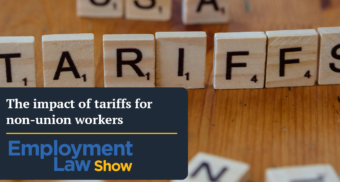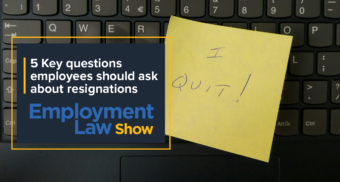Employment Law Primer for Federally-Regulated Employees | Employment Law Show TV – S6 E20
Episode Summary
EMPLOYMENT LAW PRIMER FOR FEDERALLY REGULATED EMPLOYEES, re-called to work from a layoff, business shutdown, and more on Season 6 Episode 19 of the Employment Law Show with employment lawyer Lior Samfiru, Partner at Samfiru Tumarkin LLP.
Watch above to discover your workplace rights and learn everything you need to know about employment law in Ontario, British Columbia, and Alberta, on the only employment law show on both TV and radio in Canada.
Episode Notes
No longer want to be employed after a leave of absence
I was put on a leave of absence a couple of months ago due to my vaccination status. Recently my employer decided to remove their vaccine policies and said I could return to work. I no longer want to be employed in this position. What can I do?
- Rights while on unpaid leave: Employees who have been put on a temporary layoff or on an unpaid leave of absence for any reason, including their vaccination status, can treat the absence as a termination. An unpaid leave of absence is considered a termination without cause and employees in this situation can pursue their severance entitlements. Employees who do not wish to be recalled to this position cannot be considered to have resigned from their job.
Asked to sign a new contract and then let go
My brother-in-law was let go from his job a few weeks after a new manager asked him to sign a contract that would be “to his benefit”. His severance was one week for every year he worked. Was that enough?
- A new contract years after employment: Employees should be wary of signing a new employment contract after years of employment. Employment agreements typically seek to limit an employee’s rights and entitlements in regard to severance pay. While many termination clauses are not enforceable, employees should not agree to sign an employment contract before contacting an employment lawyer to determine their rights. Severance for employees is based on several factors including the age of an employee, the length of employment as well as their position.
Waiting to be recalled to work while on temporary layoff
I was temporarily laid off at the start of the pandemic but frequently told I would be brought back every few months. It’s been nearly two years now. How much longer do I have to wait?
- Placed on a layoff: Employers do not have the right to put an employee on a temporary layoff without their consent. Employees who have been laid off, regardless of the province, do not have to wait to be recalled to work and can treat the layoff as a termination of employment. Employees have up to two years after the initial date of termination to pursue their severance entitlements. For many employees who were laid off as a result of the pandemic, this limitation period could be fast approaching.
- LEARN MORE ABOUT TEMPORARY LAYOFFS
Temporarily laid off in Ontario?
Layoffs in BC
Temporary layoffs in Alberta
- LEARN MORE ABOUT TEMPORARY LAYOFFS
Employment Law Primer for Federally-Regulated Employees
- Federally regulated vs. provincially regulated employees: The vast majority of employees are considered to be provincially regulated employees and their rights are determined by the provincial government. There are certain employees, generally a small percentage, that are regulated by the federal government. Some examples of federally regulated employees are bank employees, as well as those who work in telecommunications and inter-provincial trucking.
- Federally regulated employees be fired without a good reason: Most employees can be let go for any reason as long as adequate severance is paid. Federally regulated employees, cannot be let go for any reason. Federally regulated employees can only be let go generally for cause or an inevitable business reason, such as a business shutdown. Federal employees can be reinstated to their previous positions and could potentially be owed back pay.
- Severance pay for a federally regulated worker: Federally regulated employees who have been let go properly are owed severance pay at the same rate as provincially regulated employees. The minimum severance entitlements might differ for federal employees but the full common law entitlements remain the same.
- Rights when a substantial change is made to their job: The concept of constructive dismissal also applies to federally regulated employees. Employees cannot have their fundamental terms of employment changed by their employer without their consent.
- Help from an employment lawyer: Employees who are considered federally regulated are within their rights to speak to an employment lawyer if they are non-unionized and are concerned about their rights and privileges. Unionized federal employees must speak to their union representatives and are unable to seek external legal advice.
Businesses shutting down and severance pay
My small business has taken a beating due to the pandemic. If I shut down the business, do I owe my employees any severance pay?
- Business closures and entitlements: Employers have struggled due to the pandemic and continue to do so. Employers who are struggling financially still owe the same amount of severance pay to their employees. It is important to note that if there is legitimately no money left to give or a bankruptcy is filed by the employer, employees might not be able to receive any severance pay.
- Learn more
Mass layoffs and severance pay
- Learn more
Wages reduced for several months
My employer reduced my wages about seven months ago when we took on different clients. Is there anything I can do about it after so much time has passed?
- Reduction in pay for employees: It is important to note that employers do not have the right to reduce an employee’s pay significantly regardless of financial difficulties or a slowing down of business. Employees who do not voice their concern or refusal as soon as possible can be considered to have accepted the change as a new term of employment. Employees should be careful of accepting a change of employment as it can no longer lead to constructive dismissal as well as give the employer the permission to implement future changes.
Fired for cause after filing a harassment complaint
I was fired for cause after lodging a complaint with HR over ongoing bullying by colleagues. The termination came as a surprise, as there were no warnings or advance notice. What should I do?
- Harassment in the workplace: Employers must take harassment and bullying allegations in the workplace seriously. All employees have a right to work in a safe and harassment-free work environment. Employers not only have an obligation to investigate and rectify claims of harassment but it is also considered illegal to penalize employees for voicing their complaints. Employees who have been terminated or penalized for speaking up regarding harassment will not only be owed severance upon termination but also additional damages.
NEXT EPISODE: Employment Law Show S6 E21 – 5 best times to contact an employment lawyer
PREVIOUS EPISODE: Employment Law Show S6 E19 – Maternity and Parental Leave Primer




